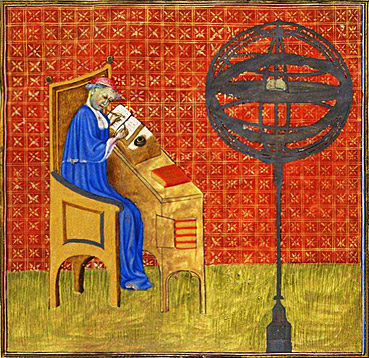|
Ulrich Taschow
Nicole Oresme and the Spring of Modern Age
The Origins of our modern quantitative-metric Strategies of World-Conquest and modern Culture of Consciousness and Science
AVOX VERLAG, Leipzig 2003, 4 Books in 2 Volumes, 1001 ( + XVII) Pages, 25 Illustrations, weight 2,34 kg ISBN 3-936979-00-6
1. Book: The mathematical Conquest of the World
2. Book: The Construction of the Reality of Consciousness
3. Book: The Bridging between the Ego and the World
4. Book: The Miracle of a „faultless“ Perception
Price: € 139,80 / GB £ 96,12 / US $ 168,31 / AU $ 239,06 / CHF 213,34
Buy it directly here at AVOX VERLAG, Germany, D-04229 Leipzig, Weißenfelser Straße 4, Fax:+49 (0)341-92 73 53 3, E-Mail: info(at)avox-verlag.de
Available too at book trade, for instance www.buchhandel.de / www.amazon.de etc.
Shortly: In the tradition of such revolutionary historians of culture, mentality and the psyche as Pierre Duhem, Anneliese Maier, Marshall Clagett, Michel Foucault, Johan Huizinga and Julian Jaynes, the author undertakes a fascinating search for the beginnings of our modern western culture with special focus on the middle ages.
By means of a profound analysis of the writings of Nicole Oresme - the so-called Einstein of the 14th Century - and other medieval authors, he suggestively connects his spectacular findings in the fields of European history of science, culture and the psyche, presenting a successful interdisciplinary synopsis that offers surprising conclusions.
Cover Text: What are the essential characteristics of our western culture and what are the determinants of its development? How can we explain its unique development since approximately the eleventh century? Why and since when did we start to measure, quantify and rationalize the world? How old is the idea of progress and what are its origins?
In his exciting search for the beginnings of our modern western culture, the author unites in a unique synthesis the “fundamentality” of Pierre Duhem, the argumentative meticulousness of Anneliese Maier and Marshall Clagett, the provocative attitude of Michel Foucault and the empathy and speculative mind of Johan Huizinga.
The profound interdisciplinary analysis of the extensive work of Nicole Oresme, probably the most original thinker of the 14th century, serves him as productive guide. Most of the forgotten treasures of the European history of knowledge, culture and the psyche, which are brought to light in this book, must appear quite incredible to the layman:
In medieval thought, everything was anticipated, from the modern Information Theory, System Theory, the Self-Organization and Chaos Theory; the discovery of the Complexity, Indetermination and Infinity of the world, the Wave-Mechanics of sound and light, the Theory of Overtones of the 19th century; the psychological discovery of the Unconscious, of the Constructivity and Subjectivity of Perception; H. v. Helmholtz’ “Theory of Unconscious Conclusions of Perception”… to the first formulation of a modern Theory of Cognition, Psycho-Cybernetics and Psycho-Physics in the sense of G. Th. Fechner.
These late medieval innovations are overshadowed by a mania of quantification that far surpasses the intentions of the later „scientific-technical revolution“. Since then, nothing fundamentally new seems to have been produced. On the contrary, in the following period up to the end of the 18th century, on the basis of losses of knowledge in various senses, a dark veil descended over the Occident…
Many of these medieval insights, which anticipate the self-image of modern time, are closely bound up with the “Model Music” (unusual for present-day thinking): The Musica functioned as a kind of “Computer of the Middle Ages” and in this sense it represented the all embracing hymn of new quantitative-analytic consciousness!
These „anachronistic“ late medieval anticipations, as well as a large number of more striking historical phenomena of the psyche and mentality of that time up to the present, prompt the author completely revise conventional models of history. In doing so, he uses the cataclysmic results of the psychologist Julian Jaynes. Together with his theory of the Evolutionary Consciousness this leads to a new explanation-model for the development and the global exceptional position of western culture:
Therefore Consciousness has no biological origin but is the result of socio-cultural influences, which are subject to strong historic changes and will possibly vanish again...
Voicing a whole plethora of new questions, the book shows how little we actually know about our history. This revolutionary book, which presents a point of no return, urgently demands extensive discussion...
|

